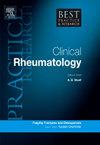终生之旅:青少年特发性关节炎的长期展望。
IF 4.8
2区 医学
Q1 RHEUMATOLOGY
Best Practice & Research in Clinical Rheumatology
Pub Date : 2024-09-01
DOI:10.1016/j.berh.2024.101984
引用次数: 0
摘要
青少年特发性关节炎(JIA)是一组多种多样的慢性炎症,起病于儿童或青少年时期,一直持续到成年,其严重程度和结果各不相同。这篇综述讨论了 JIA 患者转归的复杂性,强调从儿科到成人护理的转归不当会导致随访丧失、治疗中断和疾病活动增加。此外,疾病分类方面的挑战也阻碍了跨生命周期护理的连续性。研究还指出,由于异质性和表型的不断变化,预测JIA的长期预后仍然很复杂。疾病类别、关节受累和治疗等因素会影响疾病活动、功能障碍和生活质量。尽管治疗策略取得了进步,但仍有相当一部分患者会出现长期残疾和关节损伤。最后,需要强调的是,要优化成年 JIA 患者的长期预后,需要采取多方面的方法,包括结构化的转归过程、个性化的治疗策略以及合并症的综合管理。我们需要进一步开展研究,以完善预测模型,改进疾病监测工具,并了解疾病活动、治疗反应和长期预后之间复杂的相互作用。本文章由计算机程序翻译,如有差异,请以英文原文为准。
A lifelong journey: Long-term perspectives on Juvenile Idiopathic Arthritis
Juvenile Idiopathic Arthritis (JIA) represents a diverse group of chronic inflammatory conditions that begin in childhood or adolescence and continue into adulthood, with varying severity and outcomes.
This review discusses the complexities of transitioning JIA patients emphasizing that inadequate transition from pediatric to adult care leads to loss of follow-up, treatment discontinuation, and increased disease activity. Furthermore, challenges in disease classification hinder continuity of care across lifespan.
It is also pointed out that predicting long-term outcomes in JIA remains complex due to heterogeneity and evolving phenotypes. Factors such as disease category, joint involvement, and treatment influence disease activity, functional disability, and quality of life. Despite advancements in treatment strategies, a substantial proportion of patients experience long-term disability and joint damage.
Finally, it is underscored that optimising long-term outcomes in adults with JIA requires a multifaceted approach encompassing structured transition processes, personalised treatment strategies, and comprehensive management of comorbidities. Further research is needed to refine predictive models, enhance disease monitoring tools, and understand the complex interplay between disease activity, treatment response, and long-term outcomes.
求助全文
通过发布文献求助,成功后即可免费获取论文全文。
去求助
来源期刊
CiteScore
9.40
自引率
0.00%
发文量
43
审稿时长
27 days
期刊介绍:
Evidence-based updates of best clinical practice across the spectrum of musculoskeletal conditions.
Best Practice & Research: Clinical Rheumatology keeps the clinician or trainee informed of the latest developments and current recommended practice in the rapidly advancing fields of musculoskeletal conditions and science.
The series provides a continuous update of current clinical practice. It is a topical serial publication that covers the spectrum of musculoskeletal conditions in a 4-year cycle. Each topic-based issue contains around 200 pages of practical, evidence-based review articles, which integrate the results from the latest original research with current clinical practice and thinking to provide a continuous update.
Each issue follows a problem-orientated approach that focuses on the key questions to be addressed, clearly defining what is known and not known. The review articles seek to address the clinical issues of diagnosis, treatment and patient management. Management is described in practical terms so that it can be applied to the individual patient. The serial is aimed at the physician in both practice and training.

 求助内容:
求助内容: 应助结果提醒方式:
应助结果提醒方式:


